Published Sep 25, 2021
John Billingsley Explores the Ethics of Similitude
The actor talks about the classic episode of Enterprise, and the moral quandaries that follow viewers from Trek into the real world.
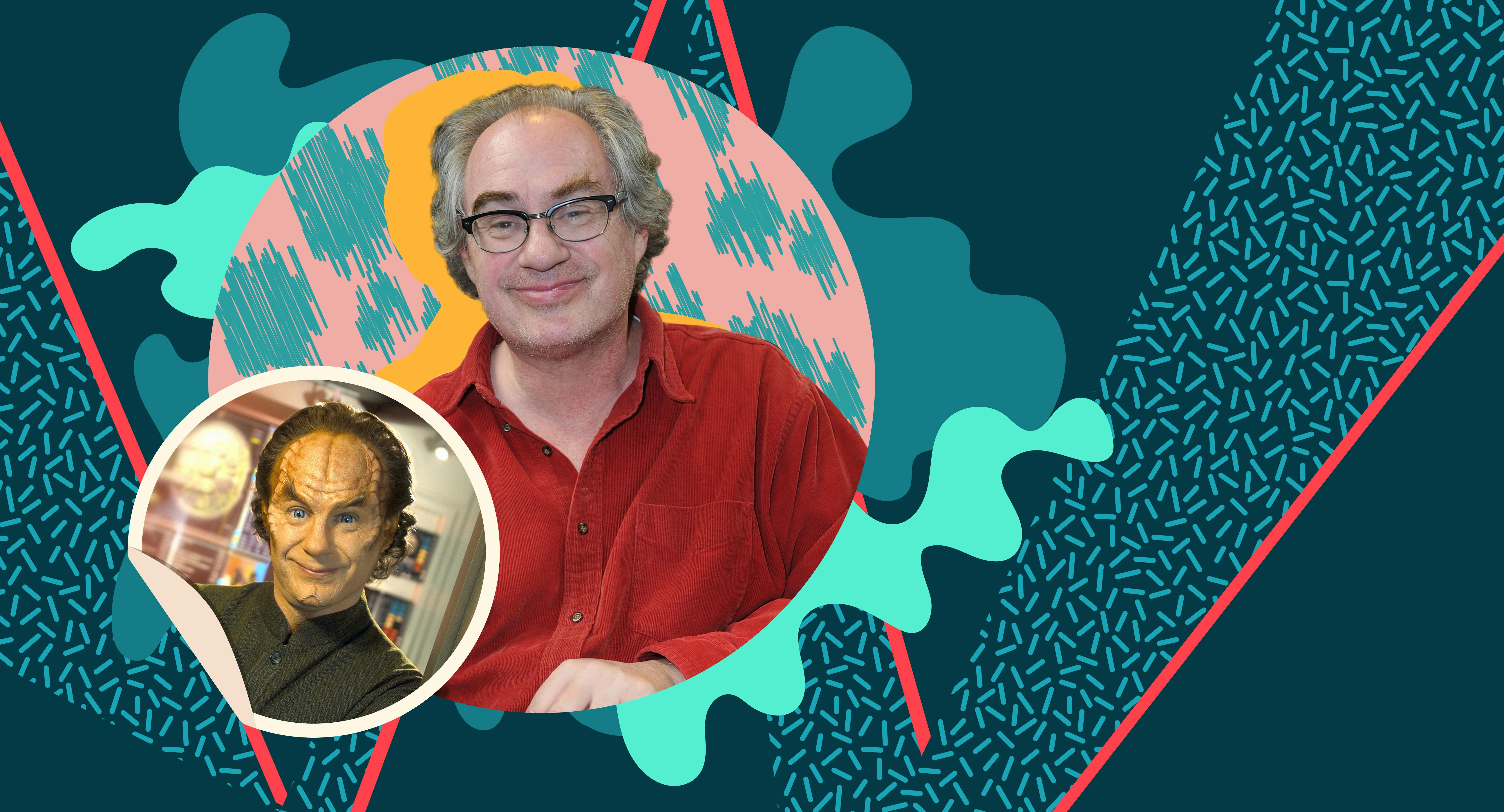
StarTrek.com | Getty Images
This article was originally published on November 19, 2019
Star Trek: Enterprise's third season focused on Captain Jonathan Archer's pursuit of the Xindi and their devastating weapon designed to destroy Earth. Archer strayed from his ideals more than usual on that perilous mission, but the events of "Similitude" presented an incredibly unique dilemma. With Commander Charles "Trip" Tucker III severely injured and in a comatose state, Archer authorized Doctor Phlox to create a mimetic symbiont of Tucker so that the physician could harvest neural tissue and save the original chief engineer.
However, the discovery that the symbiont known as Sim could potentially lead a full human life, so long as his neural tissue remained unharvested, further complicated the already precarious ethical situation.
Today marks sixteen years since "Similitude" premiered, and StarTrek.com managed to catch up with John Billingsley, whose character Dr. Phlox played such a vital role in the episode. The actor and activist talked about the classic episode of Enterprise, and the moral quandaries that follow viewers from Trek into the real world.
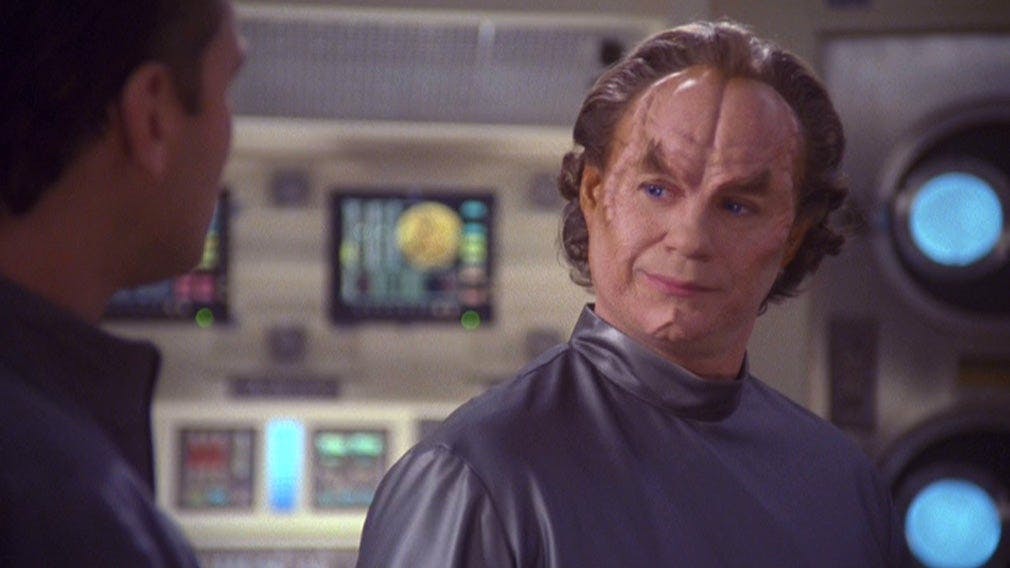
StarTrek.com
StarTrek.com: Enterprise's third season established that Archer and his crew might have to sacrifice some of their ideals in order to save Earth from the Xindi. What was your reaction to the "Similitude" script when you finished reading it?
John Billingsley: As I recall, “Similitude” was one of the scripts that I took an immediate shine to. I thought it did what Star Trek does best: it wrestled with a moral issue using contemporary scientific concerns that are relevant to the world we’re living in; it explored issues that we’re going to be facing more and more often in the years ahead. It also did something else that Star Trek does when it is at its best. It gave everybody on the show something rich and interesting to play, which I think is always exciting about the best episodes of Star Trek. Everyone dug into the challenge, and did a great job, because they were animated by the central question, but also because the episode itself had a great arc.
I also thought it didn’t put its thumb down on the scale too heavily on either side of the question, as I think some episodes do. It had a lot of tenderness, and it was extremely well cast. If I’m remembering correctly, the various actors who played Sim did a terrific job until the handoff was made back to Connor.
The initial expectation was that Sim’s neural tissue could be harvested without any complications so that he would live out a symbiont's normal 15-day lifespan. How would you have responded to the idea if it had been presented as the only option to save a loved one?
JB: Well to begin with, I’m old (laughs). One’s relationship to death and mortality is different than when one is young. When you’re twenty and it seems as if a loved one or a peer is dying, you might perceive it as a tragedy and do anything to save them. At a certain age, you begin to think differently about the inevitability of death, at least I do. So I’d be much less inclined to seek a radical contravention of an inevitability. I suppose if the loved one is killed prematurely by a lightning strike… and there’s the possibility of taking tissue, cloning somebody, harvesting that tissue, saving the real person’s life, and the clone dies… oh I don’t know, how much does it cost?
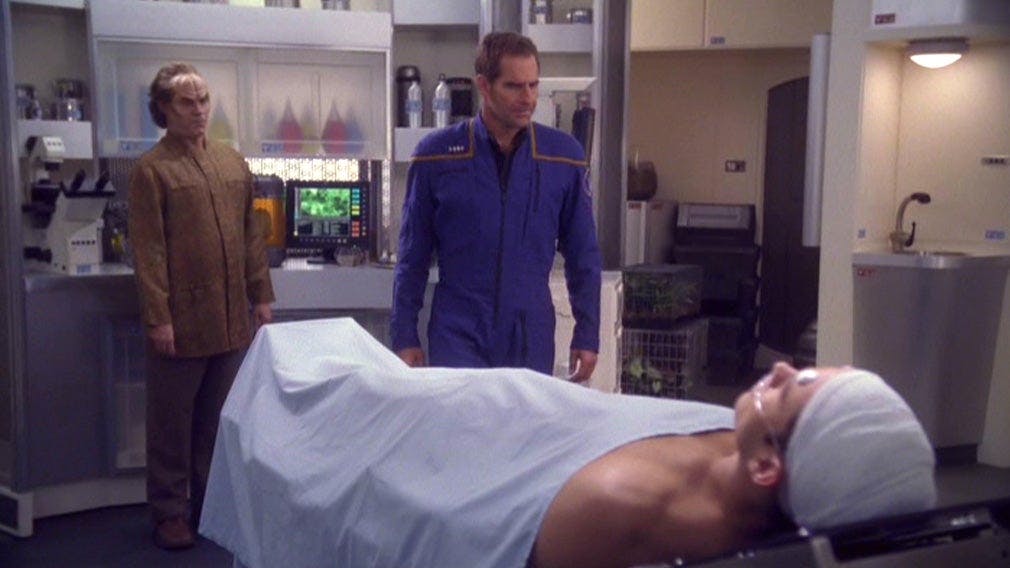
StarTrek.com
It’s Star Trek, so let’s assume it’s free...
JB: You know, these moral quandary questions... there’s never any price tag [laughs]! In real life, you can’t even get a tooth extracted without having to get a second mortgage on your house. I’m just saying, I probably couldn’t afford the cloning procedure… so that solves that problem! This is how one sidles around moral quandaries in life. Just call me "The Sidler!"
Dr. Phlox quickly becomes Sim's primary caregiver. Did you approach that relationship as one derived from Phlox's previous experience with raising children or the fact that Phlox created him?
JB: I think... probably both. In terms of the acting challenge, it’s pretty easy to relate to a kid, to have real emotional availability. Those scenes play themselves — you don’t have to do a lot of soul searching to make the scene function. But yes, I think if you were to analyze what the character’s motivations were, Phlox probably has a gajillion kids; I suspect he was a boffo pop, and he is obviously an extremely empathetic person. Witness his affection for a bevy of plants and animals, as well as his generally humanistic bedside manner. In essence, he did create - albeit in a Frankensteinian way - this clone, so he had to assume parental responsibility for it, and he did so gladly.
Phlox eventually discovered that the transplant procedure would kill Sim. Did Archer’s authorization of Sim's creation shield your character from any of the guilt over that tragic revelation?
JB: There was certainly a deep sense of loss, but I think the overriding importance of saving Trip to complete the mission won out over guilt, yada yada yada. I suppose that Dr. Phlox was, as he often was when he had to make one of these horrible medical decisions — like killing off an entire fucking species [in “Dear Doctor”] — forced to pay for his decisions with some sleepless nights.
Oh, wait, he only slept once every 16 years, or something like that. Well, maybe he denied himself dessert for a couple of weeks as a form of 'hair-shirt-ism.’
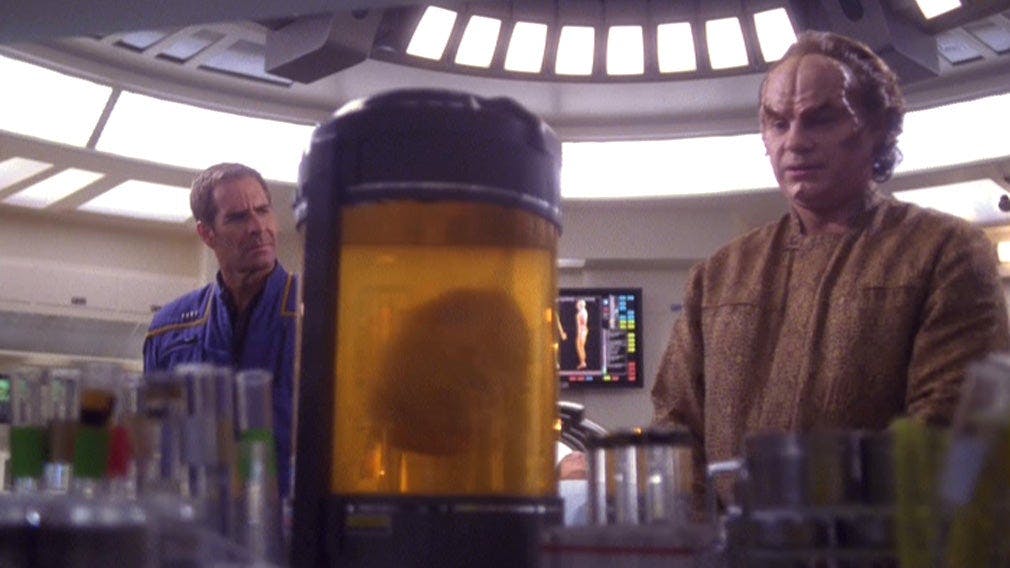
StarTrek.com
Your character always maintained an open mind about medical issues and procedures. Regardless of the episode's outcome, do you believe Phlox would have personally sanctioned Sim's creation?
JB: While putting myself back in the brainpan of Dr. Phlox is tough at this point, I think on balance Dr. Phlox would probably have gone along with it. He was a tricky cat though, because sometimes he would take a moral stance that would run opposite to what somebody who is more pragmatic might have argued for. When the fellow who was his racial enemy came on board [the Antaran named Hudak in “The Breach”], Phlox was bound and determined not to treat the guy because that’s what the guy said he wanted. That was an instance where I’d say that Phlox was perhaps less “Phloxian” than he normally is, but Phlox generally weighed both sides of an equation and tried to balance virtue and pragmatism as best he could.
Although, the episode — again — in which he did destroy a whole race [“Dear Doctor”] is where I might question some of his thinking. In “Similitude,” I think the need to save Earth tipped the scale against him not cloning Trip. Then again, there’s the episode where the captain is going to push someone out of the airlock [“The Anomaly”], where we seem to be suggesting that torture is acceptable in circumstances where the world is at stake. Me no likey. Don't think Phlox was asked to weigh in on that one, thank God. Maybe he was in the little alien's room when that issue was being bandied about.
Anyway, that's one of the things I liked about “Similitude.” It neatly balanced all of the various quandaries. “Balanced quandaries” would make a good memoir title. Or a bad memoir title. Not sure. Another quandary.
How did the father/son relationship between the doctor and Sim affect Phlox's medical impartiality?
JB: Well, he was certainly distraught to have to follow through on what amounted to a form of murder… but it didn’t stop him from doing it either!
Many fans consider "Similitude" to be one of Enterprise's best episodes. Did you anticipate that sort of reaction before the episode aired?
JB: Yes. When anybody asks, I always say that this was my favorite episode. I think it combines the characteristics of the very best of Star Trek in a single episode. I thought it was poignant, I thought it was moving, I thought everybody was given a lot to do, I thought everybody had an emotional investment in the outcome of the story and was utilized well. It was a compelling issue… it gets at the heart of what challenges us all today. How much power should we arrogate to ourselves over the creation or prolongation of life? So often there’s a case to be made for technology as a lifesaver, and an equally strong case to be made against tech as a 'values' eroder.
With all of these technological fixes in our world… the imbroglio around privacy versus ease of communications, for instance. There’s no easy answer, there just isn’t.
If you could change one of Phlox's choices in the episode, what would it be? Why?
JB: Looking at the key decisions, from bringing the idea to the captain in the first place— I don’t know if I can look at Phlox's decisions, in the context of the story, and in the context of what the stakes were, and say that I would have made different choices than Phlox. I’m sure each of those decisions was extremely hard for him. Fortunately, I'm an ignoramus, and nobody would ever ask me my opinion in an instance such as this, nor could I clone a soul, not if my life depended on it. I can barely get the toilet paper on the spindle. The spindle shoots out and then the toilet paper unrolls, and there's a big mess... but I digress.
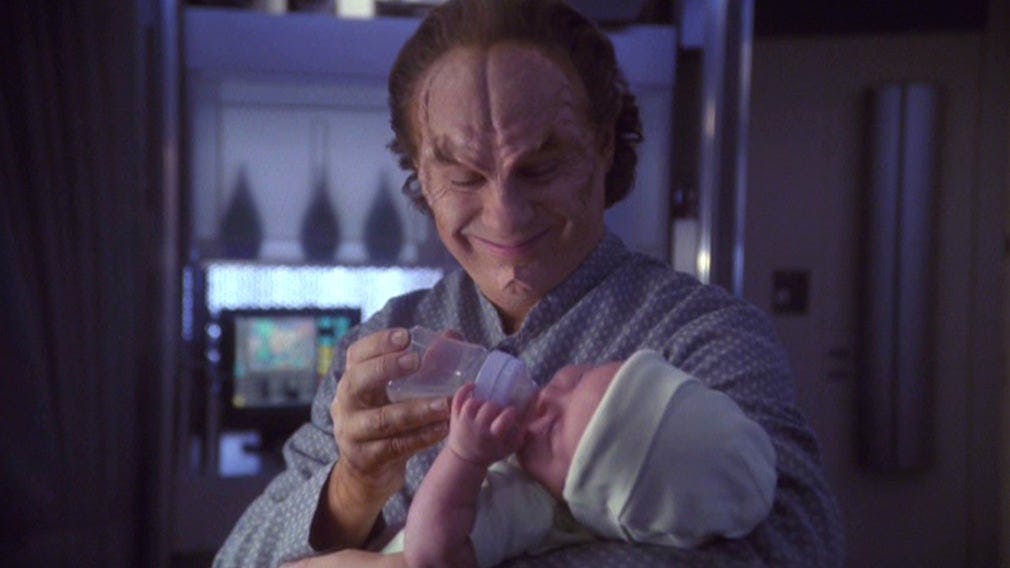
StarTrek.com
Were any of the episode’s scenes more challenging to film than the rest?
JB: No, not really. It’s fairly easy as an actor to drop into scenes where things are fraught, scenes where you realize that somebody you love is going to die or you have to make a decision that’s going to cause a lot of people pain. Those scenes kind of act themselves.
Candidly, the hardest scenes in Star Trek are usually the ones where you have to convey a lot of information and much of it is ‘gobbledygook-y technobabble’. Where you’re talking about enzymes in the endocrine system and nanobots in the warp drive and blah, blah, blah. I don’t remember this episode having too much of that, and that’s one of the things I really liked about it. It presented a scientific solution to a problem, but it didn't make a huge meal of the science, most of the episode was about the problems that stem from the execution of the solution.
What about the scenes where Phlox was holding baby Sim?
Those are easy (laughs). The only thing you’re worried about is whether you’re going to drop the baby, because the mother is just off camera and you know she’s sweating it, plus one also hopes that the baby’s not going to puke on you.
LeVar Burton directed “Similitude.” As I recall, LeVar happened to see my wife shortly after that, perhaps on set or at an event, and told her that I must have a lot of experience with babies. My wife burst out laughing and told him I’ve spent my whole life avoiding the little buggers. As soon as somebody shows off a baby, or even pulls out baby pictures, I yell out, “I think I hear the soup boiling over, gotta go!” [laughs]
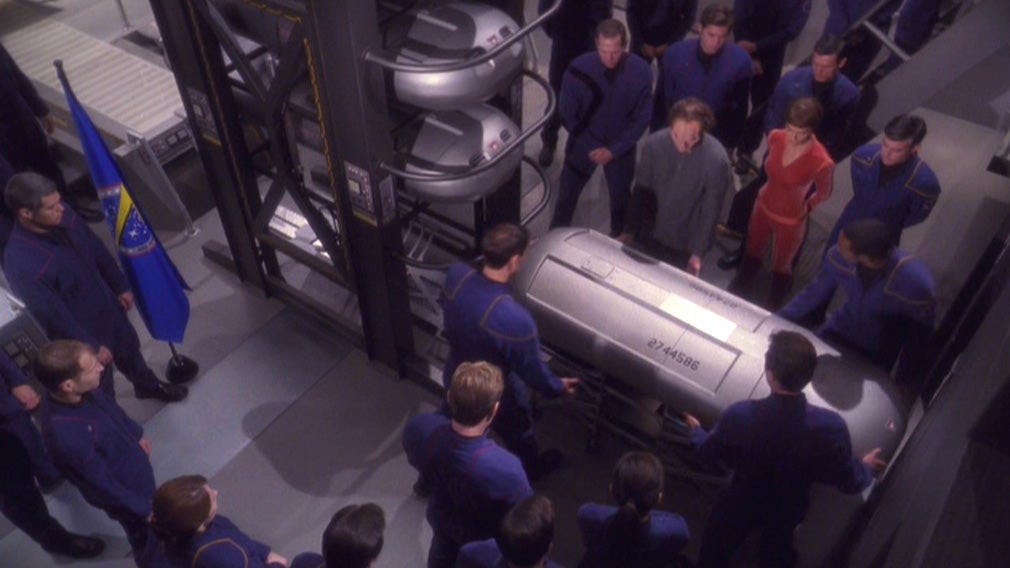
StarTrek.com
Have you ever encountered a challenge in your own life that conflicted with your morals to this extent?
JB: All the time, these days. Honestly, the thing that always gets me is trying to balance civility against personal integrity. You meet somebody at a party who says something outrageous, like "Black Lives Matter is a terrorist organization," and the internal wrestling match begins. To what extent do you bite your tongue, or just turn away? Do you pick a fight and potentially disrupt an event? There are words that can, and perhaps should, be applied to certain behaviors we are seeing in this country — and I'll leave those words to your imagination — but those words are so fucking loaded, so destined to escalate a situation if/when employed, that one is loathe to use them, publicly. I understand that one man's meat is another man’s poison, but there are lines that get crossed in conversations, and if we don't speak up… oy.
I think that’s probably the biggest challenge we face as a country right now. The question of determining which of these two values needs to be accorded more respect, civility or forthrightness? There’s no easy answer, and it depends upon the individual situation. And again, it gets back to the technology. We all have the capacity to just blurt and bleet and blast on our various chat platforms now, and it has encouraged people to say things, to be 'uncensored' —- and then we feel that much more liberated to do things, too — buried impulses ain't staying buried, shitty impulses that weren't acted upon even a few years ago get acted upon now.
It brings up the question of how do we respond to that? Do we respond in kind? Do we kick people who we feel promote violence through their language, for instance, out of our restaurants, do we try to deny them a place in the public square? Do we then practice a kind of authoritarianism of our own that is just as problematic as the authoritarianism, or at the least the intolerance, that we wish to speak up against? How do we tolerate the intolerant without becoming overly intolerant? Fuck if I know.
I find that to be the great moral quandary of the age.
Jay Stobie (he/him) is a freelance science fiction writer who contributes articles to the official Star Trek website and Star Trek Magazine. He can be found on Twitter and Instagram at @StobiesGalaxy.
